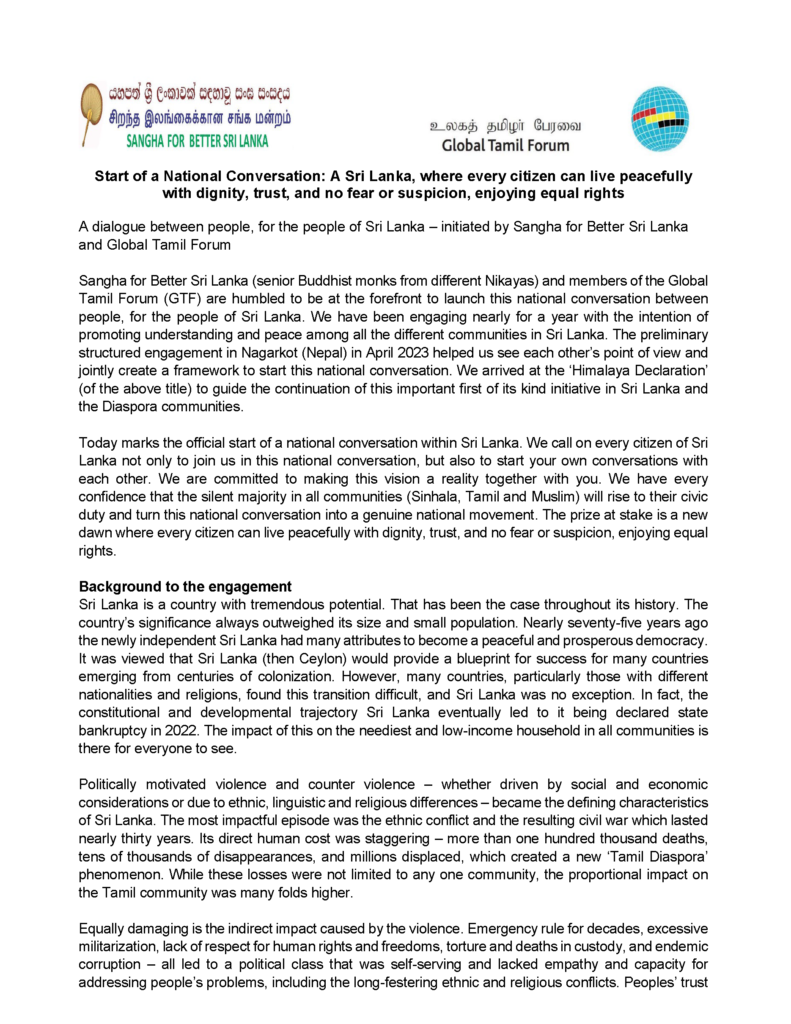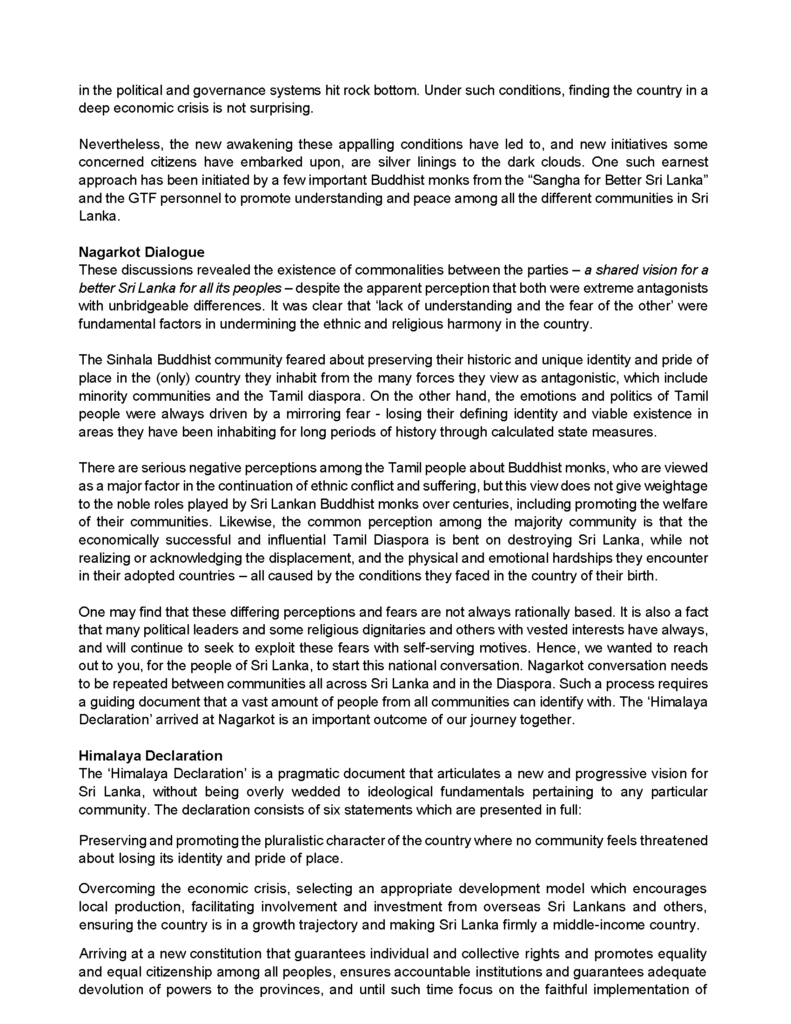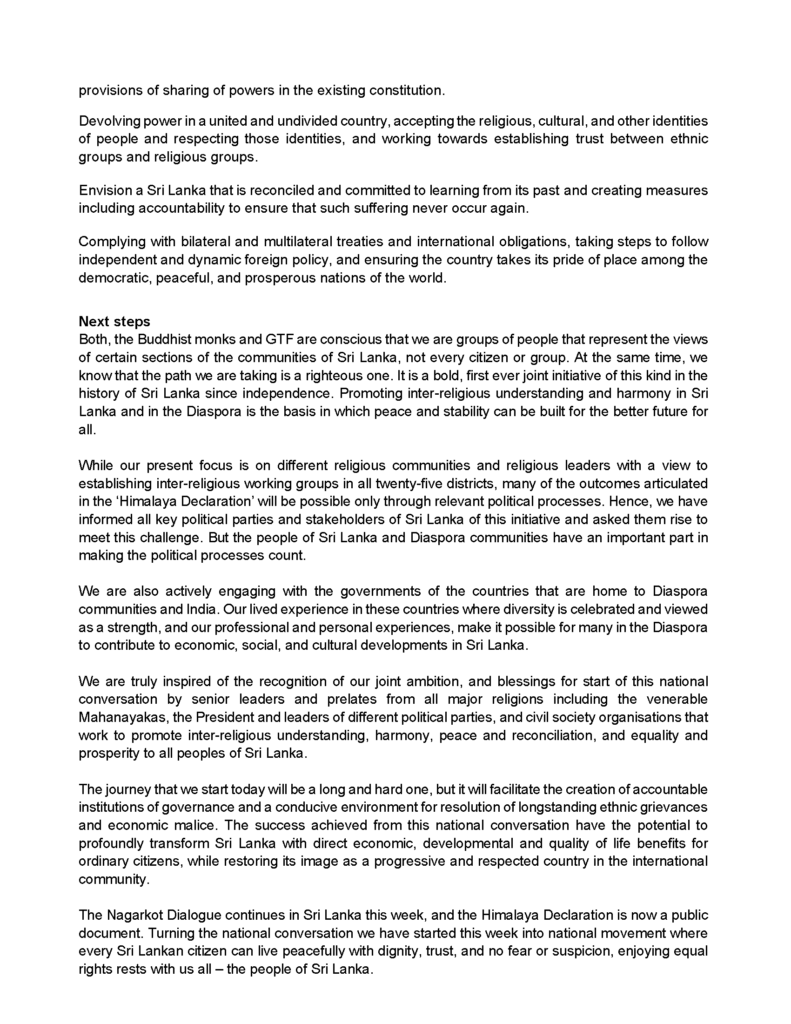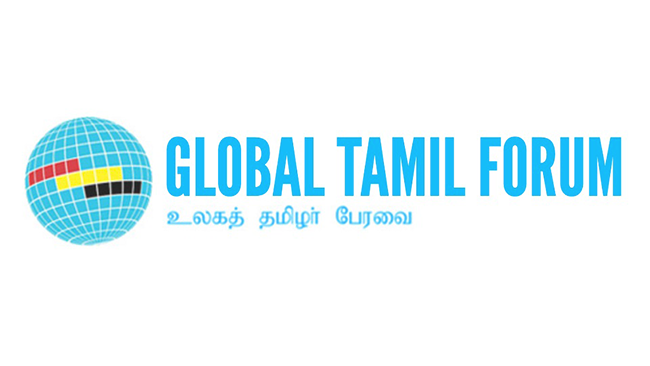Following the launch of the ‘Himalaya Declaration’, the proposed “National Conversation” among communities in Sri Lanka and Diaspora will continue with much vigour and purpose
A ‘Delegation’ consisting of senior Buddhist monks from different Nikayas (Sangha for Better Sri Lanka or “SBSL”) and members of the Global Tamil Forum (“GTF”) had various engagements in Sri Lanka from December 7 to 15, 2023. This was continuation of our fruitful dialogue in Nagarkot (Nepal) in April 2023, where both parties arrived at “Himalaya Declaration” to facilitate our engagement and advocacy efforts among different communities in Sri Lanka. The “National Conversation” was officially launched in Sri Lanka and handed over to many religious, political and community leaders, and discussed during these meetings.
Promoting interreligious understanding and harmony was fundamental to this peace building initiative and therefore the engagements were primarily focused on religious leaders – including the Mahanayaka Theros of all four Buddhist chapters, the Nallai Atheenam, the Archbishop (Cardinal) of the Archdiocese of Colombo, Bishop of Jaffna, Bishop of Colombo representing the National Christian Council and leaders of the All Ceylon Jamiyyathul Ulama.
From the outset, we recognised the importance of the political process to achieve the envisioned outcomes. Hence, the Delegation met with the President, the Leader of the Opposition, all leaders of the national political parties including SLPP Party Leader Mahinda Rajapaksa, key political leaders representing Tamil, Upcountry Tamil and Tamil speaking Muslim communities, and past Presidents and former Speaker of Parliament involved in reconciliation efforts.
Mahinda Rajapaksa was met as the leader of a party with substantial support base among the majority community and due to the fact that his support base was built with the assistance of Buddhist temples and as the primary means of securing and holding onto positions of power in the country.
Both, the senior Buddhist monks and GTF recognised a true and sincere effort to initiate a ‘National Conversation’ must engage all – whether the leaders of political parties with substantial support base among the majority community or leaders with limited parliamentary seats in the minority communities. We made every effort to meet with those who made a kind gesture by accepting our joint invitation to hear about our work to date and the launch of the National Conversation. We appeal to that handful who didn’t meet us during this engagement because of their scepticism of our joint initiative to judge us by our actions.
The Speaker of the Parliament invited all 225 MPs for a discussion with the Delegation in the Parliament Complex. We also engaged with several important civil society members from North, East and South, representatives from the ‘Aragalaya’ and key media institutions and personnel from all three languages. Delegation also met with the most relevant diplomatic community based in Colombo including India, US, UK, Switzerland, Japan, Australia, South Africa, France, Canada, ICRC, UN.
The leaders and opinion makers we engaged during this one-week period were over a hundred, and the media coverage in all three languages was exceptional. The support, encouragement and blessings we received during every one of those meetings were inspiring and well beyond our expectations.
This is an initiative exclusively between two groups, SBSL and GTF with no involvement of any external political stakeholders or countries. The aim was to start the ‘National Conversation’ to promote understanding between all communities by removing the suspicions and fears plaguing them for decades. For example, from the Tamil perspective it was the Buddhist monks who always thwarted any attempt at political resolution, whereas the majority community (in the recent past) felt the influential Tamil Diaspora was bent on destroying the country and preventing its progress. So, a dialogue between the two ‘apparent antagonists’ seemed logical. The hope is such a process, when multiplied across the country, would create an environment conducive to address many current and past issues including the national question – a task repeatedly failed due to the inadequacies of the political classes and other main issues and concerns affecting all communities. The timing for this initiative has been questioned in some quarters. We recognise that 75 years of mistrust cannot be reversed in 7 days. But we firmly believe considering the extreme political and economic challenges the country was, and is, undergoing and the new awakening these conditions have led to, present fresh opportunities to reconcile and the National Conversation to start in earnest.
The ’Nagarkot Dialogue’ dealt with many complex issues with multiple stakeholders, and therefore the process could start only with sections from both sides that had progressive outlook. Further, it was imperative that the process remained confidential until it acquired sufficient momentum to withstand potential efforts to weaken it – such has been an established practice internationally. In addition, preparing the ground was an important requirement for successful launching of this initiative, hence the timing of last week’s many engagements, including all of the heads of various religious groups, most of the key political stakeholders and others. Furthermore, lawfully initiating a ‘National Conversation’ of this magnitude between communities meant that certain protocols, local traditions and laws have to be followed, including formally engaging the Head of State.
The Declaration at its core is a framework agreement between SBSL and GTF that articulates – a shared vision for a better Sri Lanka for all its peoples. We believe this is a guiding document that a vast amount of people from all communities can identify with, hence, serve as a useful starting point for a national conversation on peace building.
Ultimately it is the national conversation among people and communities in Sri Lanka, and the political processes available to them that can lead to political outcomes in the Country. Our joint initiative is limited to facilitating such a process (led by senior Buddhist monks and GTF) and creating a trusting environment where the political outcomes are likely to satisfy the aspirations of all citizens and communities.
Despite its broader focus that avoids concepts and terminologies that are considered controversial by any one community, the ‘Declaration’ pragmatically captures the issues that are important to all communities and particularly for the Tamil community. It promotes pluralistic character and equal citizenship in the country; calls for devolution of power to all the provinces (without referring to unitary state), including full implementation of the existing constitutional provisions; and stresses the importance of accountability measures and complying with international obligations.
We are very much encouraged this initiative and the declaration articulating for pluralism, power devolution and accountability have received the approval and blessings from almost all important stakeholders in the Country, including from the chief prelates of the Buddhist chapters. These are truly remarkable outcomes that could potentially transform the Country for the better.
The declaration isn’t set in stone. The “National Conversation”, which we believe have kick started in earnest, will be shaped by the people who participate in them – GTF, along with senior Buddhist monks and other religious clergy will be one of many parties to this Conversation.
We have noted some of the criticisms aimed at this initiative from some Tamil groups in Sri Lanka and in the Diaspora. Our humble view is that these views are grossly misplaced. However, we are very much encouraged by them expressing their views. It is important that all views are heard and listened to by each other and all parties contribute and shape the National Conversation which has now truly begun. Both, the senior Buddhist monks and GTF are clear that only promoting National Conversation to facilitate a good and durable outcome, rather than prescribing a particular solution or outcome.
GTF will continue to articulate to keep Sri Lanka under international scrutiny for its past and present human rights and international and local laws violations.
In the context of such misunderstanding expressed by some in the Tamil community, we want to make it crystal clear that this is not a negotiation process with the government or other leaders of the country for a political solution. It is the elected Tamil leaders on the ground who should undertake it at the appropriate time. By fostering more understanding between religious and ethnic groups, we believe when the real stakeholders negotiate a permanent solution to the national question, there will be less opposition to scuttle the outcome and support our vision of better Sri Lanka for all.
SBSL and GTF are conscious that we are groups with limited base of constituents. We acknowledged this in the joint statement that we issued last week (attached herewith for convenience). At the same time, we are aware that this initiative is unique and the first of its kind for Sri Lanka. Our immediate focus is on different religious communities and religious leaders, with a view to establishing inter-religious working groups in all twenty-five districts. As the national conversation progresses, the intention are to also initiate similar discourse within the various diaspora communities in different parts of the world.
We are certain that with progress achieved on promoting inter-religious understanding and harmony, many people in Sri Lanka and in the Diaspora will start to feel optimistic about the future trajectory of the country.
The support and encouragement shown by most of the key stakeholders in Sri Lanka, in the Diaspora and in the international community have given us confidence to take this initiative forward with much vigour and purpose. We also want to extend our thanks to all the diplomatic missions for their kind words of encouragement and wisdom.
We present below some of the quotes and experiences from the various stakeholders we met during last week.
Most Ven Asgiriya Mahanayake Thero – “The day we build a Sri Lanka based on brotherhood, equality and peace is when a successful Sri Lanka will be for real” explaining the point on equality, the Mahanayake Thero said, “only when we make people from any religion feel as equals, is when we can claim to have created a prosperous and successful Sri Lanka” “you have taken up a noble task of going to the people. I wish you well”
Most Ven Malwatte Mahanayake Thero – “It is true what the Tamil delegates said that it was the Buddhist Monks who came to the streets to block the various agreements between parties in the past (at this meeting and in every meeting, GTF referred to the many agreements between many leaders of the past including the “Chelva – Banda Pact”, “Chelva – Dudley Pact”, the “Ceasefire Agreement” with the LTTE and the “13th Amendment” to the Constitution). A minority of these monks who preach hatred and racism spoke loudly and won the day because majority of us who love peace and equality didn’t speak loud enough at those occasions, which we must in the future”.
The Mahanayake Thero himself recited section of Pirith to bless the delegation. We understood later, the Mahanayake Thero recites the Pirith himself only on occasions when he respects and loves the delegates.
Most Ven Amarapura Mahanayake Thero – “To go separately, one doesn’t need to have love, wisdom, common sense, or work hard. It’s easy to go in separate ways. However, to come together, we need love, common sense, wisdom and have to work hard. You are embarking on a noble cause to bring people together. It’s not going to be easy. It will need hard work. Many obstacles will come your way. Be determined, patient and resilient, you will eventually be successful and we pray for you and six of the Mahanayakes together recited a section of Pirith to bless the delegation”
Most Ven Rāmañña Nikāya Mahanayake Thero – “A Sri Lanka where everyone feels safe and secured to live in any part of the country is when we have created an equal Sri Lanka for all. I bless you all for taking up this great initiative forward”
Most Ven Nallai Atheenam Kurukkal – “If this initiative can resolve some of the injustices that are being committed against the Hindus of this country, then it is worth the efforts you are making”
His Lordship Bishop of Jaffna – “History hasn’t been kind to us Tamils of this country. You are taking a very important step along with the Buddhist clergy. If a future can be built on the premise of equality and justice, then it has to be a great endeavour. I wish you well.”
His Eminence Cardinal Archdiocese of Colombo – “Sri Lanka has to address the many injustices including to the victims of Easter Sunday bombing. Going to the people and bringing resolutions through a National Conversation is a novel idea. It is a great endeavour that I am sure the Bishops Conference too will support. Wish you all the very best”
The General Council of All Ceylon Jamiyyathul Ulama – “We support with whole heart of this initiative to create a national conversation on issues faced by the many communities in Sri Lanka. Please let us know how we can be of help in this process”
His Lordship Bishop of Colombo-NCC – “We have a long history of working with some of these Ven Buddhist Monks in many programs concerning various communities in Sri Lanka. I bless you well for successful outcomes from this noble endeavour.”
Without any exceptions, all the politicians including the sitting President His Excellency Ranil Wickramasinghe, Opposition Leader and Leader of SJB Hon Sajit Premadasa, Leader of NPP Hon Anura Kumara Dissanayake, Leader of SLPP and former President His Excellency Mahinda Rajapaksa, Leader of the TNA Hon R Sampanthan, Leader of SLFP and former President His Excellency Maithiripala Sirisena, Former President Her Excellency Chandrika Banadaranayake Kumarathunge, Leader of the Sri Lanka Muslim Congress Hon Rauf Hakeem, General Secretary of Ceylon Workers Congress Hon Jeevan Thondaman, Leader of Tamil Progressive Alliance & Democratic Peoples Front Hon Mano Ganeshan, Former Speaker of Parliament Hon Karu Jayasuriya, Current Speaker of Parliament Hon Mahinda Yapa Abeywardena, Justice Minister Hon Wijedasa Rajapakshe and the 35 plus Members of Parliament from various parties who attended the meeting held at the parliament were all supportive and shared words of encouragement for the process of National Conversation.
To quote the TNA Leader, Mr R Sampanthan, he said “We should have done this many years ago” He repeated the same at least three times. He told the Buddhist Clergy that “We are many years behind you”
Most of the civil society members met in Jaffna, Colombo and at various towns in the East were cautiously optimistic and certainly acknowledged this initiative as the first of this kind in Sri Lanka.
The diplomatic community shared words of encouragement with the delegates. United States Ambassador Julie Chung in her tweet stated that “We welcome their laudable initiative to expand cross-community understanding and seek lasting reconciliation”.
The Swiss Ambassador tweeted with a photo with the delegation and representatives from the various diplomatic missions present in Colombo, “It was an honour to meet with the @GTFonline and Buddhist Monks and to support the Himalayan Declaration, which outlines a vision for a united, pluralistic and peaceful Sri Lanka. A significant step towards reconciliation.”




